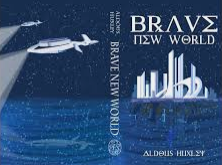Hopelessness and Holidays: “Brave New World” Review

February 18, 2022
I do not believe I have ever truly felt a book before. Felt the words seeping into my brain, never to be forgotten. No book has ever touched me and left dregs of dialogue in my mind. I have always loved reading, but never to feel emotional. This was the case until I had the pleasure of reading Brave New World by Aldous Huxley.
Brave New World is a dystopian novel published in 1932, and, like any good dystopian story, it serves as a warning. In the book, Huxley warns readers about the dangers of the advancement of technology. In the World State (the conglomerate political system ruling over the world), the family structure has been abolished, with children being created in tubes and then raised in mass. They are taught the values of the World State via subliminal messages that are repeated in their sleep. This society is divided into five social classes: Alphas, Betas, Gammas, Deltas, and Epsilons. Epsilons and Deltas are the lower-skilled workers, Gammas are the semi-skilled workers, and Betas and Alphas are the most skilled and intelligent. There is a drug called soma which keeps the citizens from feeling dissatisfied with life. Characters are often referred to as being on a “soma holiday.”
The first half of Brave New World follows Bernard Marx, an Alpha citizen who is an outsider to the Fordian ideology of “Everyone belongs to everyone else,” meaning having multiple romantic partners is the norm. Bernard is short, slim, (the size of an average Gamma) and does not have much luck with women. While his peers are satisfied with never settling down with a romantic partner, Bernard yearns for a personal connection. When he visits a reservation (reservations being home to people who practice marriages and uphold the family structure) in New Mexico, Bernard meets John, a man who flips Bernard’s world upside-down. John was born on the reservation after his mother and father visited on a trip and his mother got left behind. Bernard invites John to come to London, and John accepts because he has heard stories of “The Other Place” from his mother. John quickly comes to realize that the Other World is not as ideal as his mother’s stories when people gawk at him and call him a “savage.”
Unlike 1984, Brave New World excels at both worldbuilding and characters. Bernard serves as a perfect example of power and success swaying a person to compromise their values. When people begin treating Bernard as if he is important, he is willing to sensationalize and exploit his friend, John the “Savage.” Bernard becomes an exact replica of the men he loathed.
John is one of the most beautifully written characters I have ever read. He does not fit in with the native people in New Mexico and he does not fit in with modern society either. Though concepts such as marriage and love are considered primitive in the World State, John is able to explore the beauties of human nature as well as its ugly side. He is one of the few remaining people in the world who has experienced genuine heartbreak and sadness. The exchange between John and Mustapha Mond, the Controller of the World State, near the end of the book is absolutely engrossing.
The only real issue with the book is its racial implications. There are several descriptions of black and indigenous characters that have aged like milk. These parts are extremely uncomfortable and really sour the book.
Brave New World is truly captivating. Lines from the book will stay with you. I will leave you with my favorite quote: ‘“I ate civilization. It poisoned me; I was defiled. And then,’ he added in a lower tone, ‘I ate my own wickedness.’”

